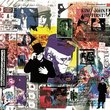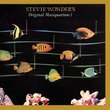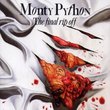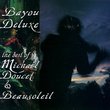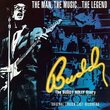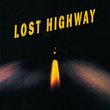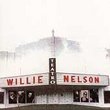| All Artists: Ida Cox, Coleman Hawkins Title: Blues for Rampart Street Members Wishing: 6 Total Copies: 0 Label: Ojc Release Date: 7/1/1991 Genres: Blues, Jazz, Pop Styles: Vocal Blues, Swing Jazz Number of Discs: 1 SwapaCD Credits: 1 UPC: 025218175821 |
Search - Ida Cox, Coleman Hawkins :: Blues for Rampart Street
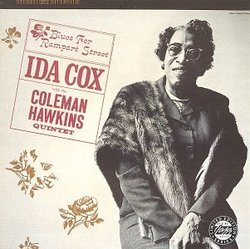 | Ida Cox, Coleman Hawkins Blues for Rampart Street Genres: Blues, Jazz, Pop
Dubbed the "Uncrowned Queen of the Blues," Ida Cox was a bit past her prime when she recorded the songs that appear on Blues for Rampart Street in 1961. But her voice still had the richness and expression that had made Cox... more » |
Larger Image |
CD DetailsSynopsis
Amazon.com Dubbed the "Uncrowned Queen of the Blues," Ida Cox was a bit past her prime when she recorded the songs that appear on Blues for Rampart Street in 1961. But her voice still had the richness and expression that had made Cox a star in her younger days, and this collection remains one of the best examples of her work. Songs like "Wild Women Don't Have the Blues" reveal the tough-minded disposition that was one of Cox's hallmarks; she had more control over her career than most female vocalists have today and wrote most of her own material. Blues for Rampart Street also includes strong takes on classics like "St. Louis Blues" and "Death Letter Blues," with able assistance from Coleman Hawkins. --Genevieve Williams Similarly Requested CDs
|
CD ReviewsMaybe she'd just finished her tea, when the phone rang.... yygsgsdrassil | Crossroads America | 07/25/2000 (5 out of 5 stars) "...They had been looking and looking for her for years.She never responded to them because, I personally would like to think, that was a chapter of her life that she closed completely and she was singing strictly for the Lord, again. But doggone it. One of those radio fellas in her home in Knoxville found her whereabouts, hounded her for an interview, and one day in 1962 turned up on her doorsteps with an old reel-to-reel recorder.And so, she recounted her story.She left home, barely a teenager to join a group of gypsy blues and ragtime singers, black vaudevillians and the assorted raggamuffin types that hang out with those who performed in evvy backwoods juke joint and subterranean after hours spot. Her folks were religious folk who required their kids to serve in the church somehow. Ida's gift was singing. Like evvy other bluesgirl's story, when she rebelled from her folks, the four fingers in a shotglass music seduced her, and how.And as she got better in her craft, so did her shows get better, the songs got sexier and sassier, and evvybody, men and women alike, were coming to her performances. And she became provocative, she dressed provovative and became direct competition to the likes of Bessie Smith, Ethel Waters and Ma Rainey. On the streets they called her 'The Sepia Mae West'. The men loved her revealing outfits.She wrote many of her own tunes--"Wild Women Don't Have the Blues", "One Hour Mama", "Handy Man". And was one of the first blues singers who recorded many, many of her tunes ala the way many modern singers do it today. And performed with Benny Goodman, the Count and other bands. She was at the top of her game, on top of the world.On top of the world until, one night in the 40's she passed out during a performance in New York. She had a stroke and what she thought was the Lord's message to get back to His work.She turned her back from the stage and began living with her grown daughter in Knoxville and sang only in her church choir--getting back to the Lord's work--and lived life in relative obscurity till this guy with the reel-to-reel shows up, interviewing her. And on the tape she tells stories of how she wrote certain songs, who she met on the road, and who she recalled were with various bands. What led to "Blues For Rampart Street" is that she sung a few bars of some of her songs during the taping, here and there--for the story's effect, you know.But, it somehow led to renewed interest in the Uncrowned Queen of the Blues and, hence, this fabuloso 1962 recording with Coleman Hawkins, et al (word has it they were gin sopped when they first sat for recording sessions). The rest, as they say, is history.I know, it sounds like a movie, but its true. A great story of an American original...thanks for enduring my thumbnail version of her story. But, feel free to look up the Queen further, by investigating her earlier recordings and other history." I may only have 1 leg, but I know good music when I hear it! one-legged-willy | west philly | 05/10/2004 (5 out of 5 stars) "Hey I've got two ears, even though I've only got one leg, I know great blues music, when I hear it. Ida Cox recorded soem classic blues sides in the 1920s(I have all her 78 rpm's), and she tried to make a comback here with Coleman Hawkins, and darn nearly succeeded. Her vocie was in fine shape, and she sounds wonderfully miserable thru the whole session, capturing the TRUE spirit of teh downhearted mean evil blues, that same spirit that she had in those seminal 20's sessions. Here Cox is relaxed and sounds happy to be joined by the sax jazzman great Hawkins.This is a historical and wonderful issue, in 1961, not many remebered Cox, and she could have made a major comeback like Mississippi John Hurt or Skip James did, however ill heakth kept her from doing so, but true blues fans gt one HECK of a treat with this classic 1961 LP, now avaialbale here at Amazon on CD!!! She covers all her trademrk sonsg with new difinitive versions of Death letter Blues, St Louis Blues and the classic Wild Women Don't Get The Blues JUST BUY IT!!!Bottom line: Classic blues singer, reprises her 20's songs in style with jazz legend saxman Coleman Hawkins, ESSENTIAL CD!!!" Miss Ida's Final Statement Allen Bardin | Columbia, SC United States | 09/19/2002 (5 out of 5 stars) "The days of touring in tent shows were behind her & she had settled down to the quiet life of a church woman, but Miss Ida let out her lusty croaks one more time for Riverside Records, before she passed on. She sang of death and sweet poppas with Roy Eldridge, Coleman Hawkins & Sammy Price nudging her along in what she said was her "final statement". One of the last of the great vaudeville blues women, she went out with style and plenty of soul."
|

 Track Listings (10) - Disc #1
Track Listings (10) - Disc #1